Bigger Than Life

Plot
Bigger Than Life is a 1956 American drama film directed by Nicholas Ray, starring James Mason and Barbara Rush. The movie takes place in a suburban neighborhood during the late 1950s, where everything appears to be perfect on the surface. The story revolves around the character of Ed Avery, a high school English teacher played by James Mason, who is the embodiment of suburban idealism. Ed is a loving husband to Margaret (Barbara Rush) and a devoted father to his teenage son, David (Richard Shayne). Ed's life seems to be an epitome of middle-class perfection, until he is struck with a severe case of pericarditis, a condition where the lining surrounding the heart becomes inflamed. This condition necessitates Ed's hospitalization, and after initial diagnosis, he is prescribed cortisone to alleviate the symptoms. Initially, cortisone seems to work its magic, and Ed starts to recover, slowly regaining his energy and zest for life. However, with continued usage of cortisone, Ed begins to experience severe side effects. The prolonged intake of the medication leads to his growing dependence on it, as he is unable to cope with any situation without cortisone. Ed's newfound reliance on the steroid gradually erodes his sense of responsibility, causing his relationships with his family to deteriorate. Margaret and Ed's marriage, once filled with romance and understanding, becomes increasingly strained. Ed becomes dismissive of Margaret's worries about his condition and the increasing dosage of cortisone. Despite the obvious effects of his addiction on his family, Ed's ego and self-image become tied to the idea that his problems will disappear once he gets back on cortisone. As Ed's addiction progresses, his behavior becomes more erratic and dictatorial. He starts to exert control over his family, issuing arbitrary demands that disrupt the household's routine. David, once a proud member of the family, is now constantly walking on eggshells to avoid his father's wrath. Meanwhile, Margaret, trying to keep the family from disintegration, starts to take a more hands-on approach. She attempts to reason with Ed, but it's too late; his addiction has gone too far. The once-peaceful household is now transformed into a battleground, with Ed wielding his cortisone-fueled fury like a battle-axe. One evening, while the family is out, Ed's condition reaches a critical point. He starts hallucinating, and his grip on reality begins to slip further. In a dramatic moment of self-awareness, Ed realizes the gravity of his addiction. However, by then, it's too late, as his mind is irreparably damaged. Margaret returns to find Ed on the verge of collapse, his world unraveling around him. In a desperate bid to prevent the collapse of the family, Margaret tries to reach Ed, but his ego has grown too big. He refuses to accept his vulnerability and the true state of his condition. As the once-great Ed Avery lies broken, his pride shattered, Margaret and David must decide how to save him from himself. Set to a haunting, elegiac score by Alex North, the film is a scathing critique of the American Dream's darker aspects. It portrays suburban conformity as a fragile, even toxic construct. As the family's world crumbles, they are left with an agonizing choice – between saving Ed from his addiction and risking everything to hold on to the man they once knew, or accepting him for what he has become and starting anew. While Nicholas Ray directed several acclaimed films, such as 'Knock on Any Door' and 'Rebel Without a Cause', it's his nuanced handling of the human psyche in 'Bigger Than Life' that solidifies his place as one of America's most fascinating filmmakers.
Reviews
Recommendations




